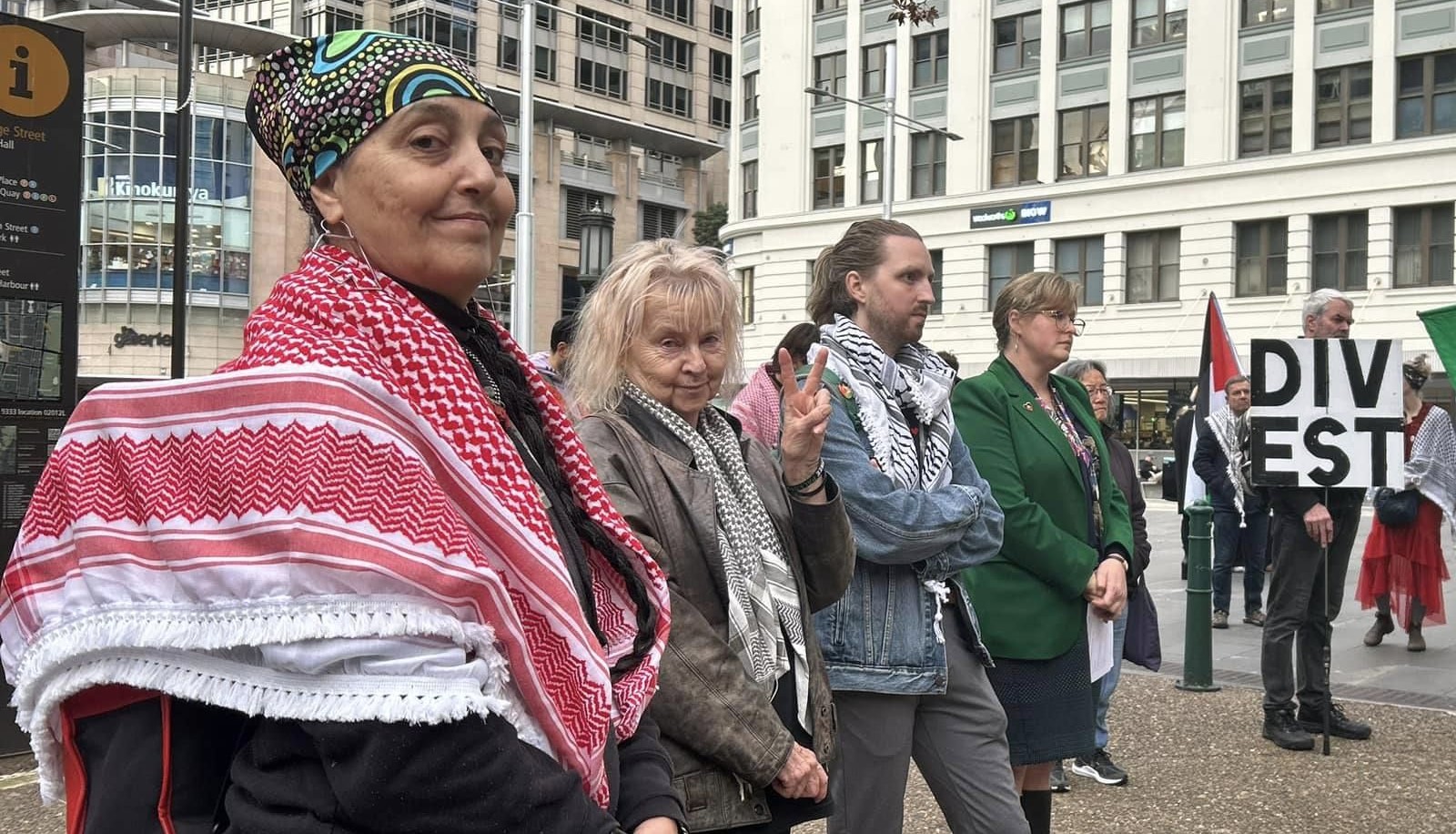
The City of Sydney Council decided at its June 24 meeting to start investigating its ties to companies that are complicit in human rights abuses in Palestine, including the illegal settlements in occupied Palestinian Territories.
The historic motion came in the wake of collaboration between City of Sydney for Palestine and Greens Councillor Sylvie Ellsmore. The council is one of Australia’s largest, and activists are hoping that it sets a lead for others to do the same.
Beforehand a rally outside the Sydney Town Hall, organised by the City of Sydney for Palestine (CoS4P) group, heard from a number of Palestine supporters.
Dr Markela Panegyres, a member of the National Tertiary Education Union (NTEU) branch committee at University of Sydney and Socialist Alliance, said Palestinians have “called on us to implement boycott, divestment and sanctions [BDS] on Israel” and the NTEU in May had voted at a mass meeting for the university to support BDS.
She said the NTEU will be “stepping up” the BDS sign-up campaign, pushing for all branches and the NTEU national executive to support it.
Ellsmore said at the rally that the City of Sydney is “one of the few” which have already passed a motion calling for a ceasefire in Gaza.
“Council already has a policy not to fund companies which are linked to human rights abuses. We hope that because of community pressure the council will move to divest from the computer company Hewlett Packard [HP], which is closely linked to the Israeli government and military.”
cos_2.jpg

Ahmed Abadla, a member of the Palestine Justice Movement Sydney, reflected that at least 40,000 Palestinians have been massacred by Israel so far and that BDS is “aimed against this barbaric, colonial-settler regime”.
Inner West Councillor Dylan Griffiths said he is working with the community to push BDS in that council. He said if the City of Sydney votes in favour it will “make it easier for other councils to move”. He intends to put a resolution on BDS at the next council meeting in August.
Rachel Evans, an activist in the City of Sydney for Palestine and who is standing for Socialist Alliance to contest the Sydney lord mayor position said: “So far the Sydney City Council has passed a ceasefire motion. If a disclosure motion is agreed tonight, we can go on to a BDS motion in the future.”
Council voted to report back on investments in companies involved in, or profiting from, any human rights violations including the illegal occupation of Palestinian territories, or in the supply of weapons within three months.
Council noted that the United Nations Office of the High Commission for Human Rights lists 97 companies that directly and indirectly enabled, facilitated and profited from the construction and growth of the illegal settlements.
At the request of First Nations councillor Yvonne Weldon, there was a minute’s silence before the motion was put.
City of Sydney for Palestine spokesperson Ash Phthalo said council had only come to that decision because of the “organising, rallying and mobilising of Palestinians and their supporters” over nine months. They said the pressure will remain until the council passes a BDS motion.
Another spokesperson Mark Gillespie said that Merri-bek and Melbourne City Councils passed motions to support refugees arriving from Gaza and that Sydney City Council should “do the same”. “We plan to introduce refugees from Gaza to the Town Hall and the Councillors,” Gillespie said.
Meanwhile, a public meeting of more than 120 people at the Marrickville Pavilion on June 23 heard from several speakers about why councils should support BDS.
Taseen Shubarta, from BDS Youth, said “there is now a rising tide of BDS in Europe, including Ireland, Spain and Portugal.
“Richmond council in Melbourne has voted to divest all city money with ties to Israel. Inner West council can follow suit.
Palestinian activist Ahmed Abadla said BDS was established by Palestinian civil society in 2005. It started small but is continuing to grow as Israeli barbarism increases.
“The Israeli regime is scared of BDS, and has always tried to suppress the movement. There is a strong legal case for adopting BDS.”
Antony Loewenstein, Jewish author, filmmaker and journalist, said: “BDS has grown massively since October last year, when Israel launched its genocide against Gaza.
Just like the struggle to end Apartheid in South Africa, the international boycott was crucial in ending that regime. Now, 35 US states have made BDS illegal so far. The pro-Zionist lobby, backed by Israel, is stepping up its push to weaponise the “anti-Semitism” label against BDS.
“But since the Israeli invasion of Gaza, public opinion has radically changed in the US, Australia and elsewhere. We must step up our campaign for BDS in the Inner West and all over the country,” Lowenstein concluded.